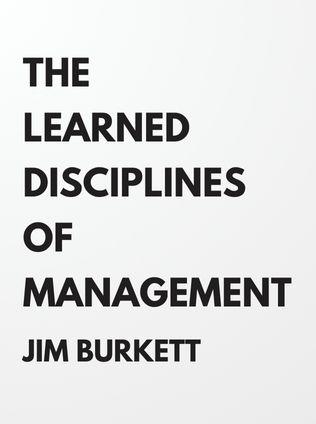
The Learned Disciplines of Management
How to Make the Right Things Happen
By Jim Burkett
Published 01/2013
About the Author
Jim Burkett is a renowned turnaround specialist and the president of Corporate Turnaround Consulting, Inc. Over the past 35 years, he has revitalized 28 underperforming and troubled companies, ranging from Fortune 500 corporations to smaller public and private entities in the United States, Canada, and Europe. Burkett's extensive hands-on experience and strategic acumen have equipped him to transform management effectiveness through the practice of the learned disciplines of management.
Main Idea
In "The Learned Disciplines of Management: How to Make the Right Things Happen," Jim Burkett shares his invaluable insights and distills decades of management experience into a practical guide. This book is designed to help managers at all levels enhance their effectiveness by mastering seven essential disciplines: planning, organizing, measuring performance, executing, following up, real-time reporting, and problem-solving. Each discipline is critical, and together they form a powerful, self-reinforcing management system that ensures the right things happen within an organization.
Table of Contents
- Introduction
- Planning
- Organizing
- Measuring Performance
- Executing
- Following Up
- Real-Time Reporting
- Problem Solving
Introduction
Effective management is not an innate skill; it requires learning specific disciplines. The management disciplines function as tools that extend a manager's skill, allowing them to accomplish more than would be possible without these tools. Your toolkit may hold management techniques passed on by your predecessor or management methods given to you by your boss. But are they the right tools? Are they tools that make you effective – tools that allow you to make the right things happen? In other words, does your toolkit hold the seven learned disciplines of management?
Planning
The first learned discipline of management is planning. Effective planning must answer two vital questions: What are the organization's aims, and what are the means for achieving them? A plan is a tool much like a construction blueprint. A blueprint depicts the project's aims and specifies the best means to obtain them. These elements make a plan executable; guiding, informing, and directing management to a successful outcome.
"An effective plan lays the foundation for management success as it rightly establishes the organization's aims and correctly determines the means for achieving them, rendering both specific and measurable." - Jim Burkett
Effective planning requires management to establish the organization's right aims. This is management's only recourse, for until an organization is mobilized toward the right aims, its efforts are misdirected, and its resources squandered. Not only must the plan's aims be the right ones, but they also must be specific and measurable. Specificity requires that management rigorously arrive at the aim's precise details. Lack of specifics is one reason an organization does not make progress in achieving its aims. Vague aims render a plan immeasurable, thus making it impracticable to manage. Measurability promotes manageability and is a critical consideration in arriving at a plan's aims and means.
Sign up for FREE and get access to 1,400+ books summaries.
You May Also Like
The Life-Changing Magic of Tidying Up
The Japanese Art of Decluttering and Organizing
By Marie KondoThe Lean Startup
How Today's Entrepreneurs Use Continuous Innovation to Create Radically Successful Businesses
By Eric RiesWho Moved My Cheese?
An Amazing Way to Deal with Change in Your Work and in Your Life
By Spencer Johnson, M.D.Make Your Bed
Little Things That Can Change Your Life...And Maybe the World
By William H. McRaven



















